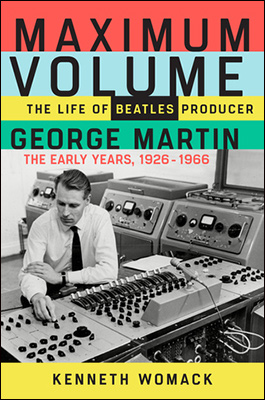 Musician, producer and engineer Jerry Hammack delivers a intensely-researched and extensively-notated deep dive into every Beatles recording from 1961-1964. The Beatles Recording Reference Manual: Volume 1: 'My Bonnie' through 'Beatles For Sale' (1961-1964) will fill in the blanks of the most ardent fans questions of how these historic recordings came to be. We asked Jerry "Five Questions" about this incredible first of a four volume set. Here's what the author had to say.
Musician, producer and engineer Jerry Hammack delivers a intensely-researched and extensively-notated deep dive into every Beatles recording from 1961-1964. The Beatles Recording Reference Manual: Volume 1: 'My Bonnie' through 'Beatles For Sale' (1961-1964) will fill in the blanks of the most ardent fans questions of how these historic recordings came to be. We asked Jerry "Five Questions" about this incredible first of a four volume set. Here's what the author had to say.
___________________________________________________________________________________________________________________
 The amount of research and information in your book is staggering. How long did this book — which only gets to 1964! — take, and when do you expect to finish the balance of their recording career? Certainly those later recordings are much more complicated.
The amount of research and information in your book is staggering. How long did this book — which only gets to 1964! — take, and when do you expect to finish the balance of their recording career? Certainly those later recordings are much more complicated.
The refinement of the research is ongoing – so far, I’m over eight years into the work. I researched their entire recording career before I began parsing the work out into the four volumes. I knew no one would want a, let’s say 2000-page book, so it made sense to deliver it in eras that related both to the work they accomplished and the stylistic period they were in. I expect to have Volume 2 available in early 2018 and the balance by the summer of 2019.

I love the quote that opens your book, from the head of Decca’s A&R department: “Not to mince words, Mr. Epstein, we don’t like your boys’ sound.” Now, I have to read this as more the cultural sound of rock’n’roll, but, as a musician, engineer and producer, how did you read that?
I read it as they just weren’t that good of a rock band! And evidenced by the Decca recordings, you might fairly conclude that. There are lots of ham-fisted guitar work and strained, overly emotional vocals to be heard. I wouldn’t have signed them from listening to that, either!
As a follow-up to that, certainly the Beatles knew what they had in their “sound” as I read it above, but how involved and knowledgeable were they in those early days about their gear, their tone, and their technique?
In all these areas, they were just learning. They were after all, just kids, don’t forget, so they had “starter” gear (guitars and amps) and not a lot else. But they knew the rock‘n’roll they loved and they also had a drive to learn and work hard. So the lessons they did learn, even from bad sessions like the Decca one – they didn’t repeat them.
How did you piece together the illustrative breakdowns of each song’s four track recording process?
The knowledge I gained of how they used the four-track, day-to-day work in the studio on a particular song, analysis of evidence like takes of the songs and various stereo remixes, plus my knowledge of old-school multi-track, tape-based recording allowed me to piece the breakdowns together. There is also some evidence to be gathered directly from artifacts like the EMI tape boxes where the engineers sometimes noted track contents. In those cases, there's no doubt about what's there.
Was there any worry that, in time, some, much or all of this information, in such detail, would become lost to time, and did that in any way motivate you?
You hit the nail on the head. This information had never been pulled together before or researched at all in some cases. Some of what was out there was based on speculation, myth, or biased confusion. I essentially am writing the books I wanted to buy, but couldn’t find. If I do my work well, no one will have to answer these questions again – they’ll have been put to bed. How did The Beatles record those hits? I wanted to answer those questions for fans and students and scholars. To do the best I can with that is a commitment I made almost a decade ago now.
Bonus Holiday Question:
Your book should be at the top of any Beatle fan’s holiday 2017 wish list, but what would be your favorite Beatles book — technical or otherwise — that should be next on their list?
 Of current releases, I have to vote for Kenneth Womack’s Maximum Volume. The Life of Beatles Producer George Martin, The Early Years, 1926–1966. It’s an untold story of the one key figure in The Beatles story that most people don’t really know. Brilliant read! When you’re able to contribute to the scholarship around such a seemingly well-tread subject, that’s really something and exactly what Ken accomplishes with this book. You realize you didn’t really know George Martin at all.
Of current releases, I have to vote for Kenneth Womack’s Maximum Volume. The Life of Beatles Producer George Martin, The Early Years, 1926–1966. It’s an untold story of the one key figure in The Beatles story that most people don’t really know. Brilliant read! When you’re able to contribute to the scholarship around such a seemingly well-tread subject, that’s really something and exactly what Ken accomplishes with this book. You realize you didn’t really know George Martin at all.
___________________________________________________________________________________________________________________
#beatles #thebeatles #jerryhammack #pleasepleaseme #withthebeatles #harddaysnight #beatlesforsale #maximumvolume #georgemartin
- Admin's blog
- Log in or register to post comments
